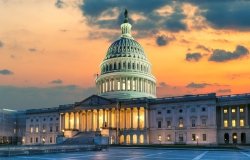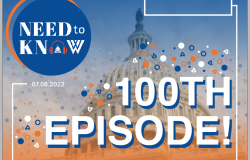Is Our Constitutional System Broken?
Kevin O'Leary, Journalist and Political Scientist; William F. Connelly, Jr., Professor of Politics, Washington & Lee University; Gregory Koger, Associate Professor of Political Science, University of Miami; Mickey Edwards, Vice President, Aspen Institute, and Former U.S. Representative (R-OK)
Overview
Kevin O'Leary, Journalist and Political Scientist; William F. Connelly, Jr., Professor of Politics, Washington & Lee University; Gregory Koger, Associate Professor of Political Science, University of Miami; Mickey Edwards, Vice President, Aspen Institute, and Former U.S. Representative (R-OK)
A group of political scientists and a former Member of Congress agreed at a Sept. 17 Constitution Day seminar organized by the Wilson Center's Congress Project that the Constitution is not to blame for perceived excessive partisanship and gridlock in Washington, but could not agree on just what is responsible or even if it needs fixing.
Former Congressman Mickey Edwards (R-Okla.), now a vice president at the Aspen Institute and a lecturer at Princeton University, said, "The Constitution is fine, but the political system is broken." He added that, "It's important to make a distinction between polarization and partisanship: polarization is necessary, while partisanship is not." He observed that Congress is united for about four minutes every two years, and then it devolves into partisanship with the first votes it takes on Speaker, House rules, and committee membership ratios. Even though 40 percent of the American people identify themselves as independents or politically unaffiliated, Members of Congress brag about voting with their party more than 90 percent of the time.
Edwards said Members spend most of their time in partisan sparring matches while ignoring the most serious problems facing the country like deficits, illegal immigration, and how to handle terrorists. The main reason the political system is broken, concluded Edwards, is that Congress has ceded too much power to the President, especially on matters of war and peace. A "gang of eight" leaders get classified briefings from the Administration on sensitive national security issues, but cannot inform their colleagues about what they know. All Members should insist on being fully informed or simply withhold money from the Executive Office of the President.
William F. Connelly, Jr., of W&L University, author of "James Madison Rules America: The Constitutional Origins of Congressional Partisanship," presented a different view of partisanship than Edwards, saying it was built into the Constitution and the way politics has always been conducted in our system—dating back to the Federalists and Anti-Federalists—the precursors to our formal two-party system. While many Americans recoil at the specter of a system "marred in partisanship and gridlock," the fact is that's how it's always been and ever will be as long as we have the freedom to disagree. Connelly said the arc of U.S. history is a pendulum, that swings between stability and energy. Periods of inaction are followed by periods of action, such as the New Deal following the Hoover presidency, LBJ's Great Society legislative juggernaut following stalemate under Kennedy, and the bipartisan action on welfare reform and balanced budget legislation following the government showdown and shutdown between Speaker Gingrich and President Clinton in 1995-96. Neither role of activity or stasis is natural to Congress, but the alternation from one to the other is a tradition throughout our history, Connelly concluded.
Gregory Koger of the University of Miami focused on the constitutional role Congress is supposed to play in controlling the purse strings of government, and found that in recent years the trend has been toward taking longer and longer to finish appropriations work, and toward bundling more and more of the 12 or 13 regular bills into an omnibus bill after the fiscal year has already begun. Koger's research revealed a number of factors responsible for the delays including policy disagreements between the President and Congress and the parties, and Senate filibusters. He said Congress was more likely to act sooner during presidential election years, but otherwise has become increasingly dysfunctional in getting its work done on time.
Kevin O'Leary, a writer for Time, a political scientist, and author of "Saving Democracy: A Plan for Real Representation in America," said the U.S. has not lived up to its democratic ideal of more equitable representation for all. The Constitution has prevented this evolution by creating the Senate in which small states are disproportionately represented and powerful. The Senate is "certainly a violation of one-man, one-vote." The House of Representatives, while more equal in its representation, falls far sort of being truly representative because of the way district lines are drawn by state legislatures to favor the more extreme ends of both parties. While O'Leary stopped short of recommending the abolition of the Senate, he said a system might be considered to weight the votes of Senators according to their states' populations. Non-partisan commissions could be relied on in apportioning House seats, as some states have already done. Finally, a system of town hall meetings across the country, drawn from citizens by random sample, could debate important issues of the day and serve as a check on and advisory body to Congress.
By: Don Wolfensberger
Director, Congress Project
Thank you for your interest in this event. Please send any feedback or questions to our Events staff.











